Workshop Report – Refugees and Children: Writing, Exhibiting and Depicting Refugee Stories for Children – Birkbeck College 3 March 2017
Earlier this month, the Reluctant Internationalists held a one-day workshop on the process of researching, writing, exhibiting and depicting stories about refugees to children. The workshop brought together children’s authors, illustrators, publishers, museum professionals and academics to juxtapose different disciplines’ ways of depicting the stories of refugees for children. Discussions in four sessions explored how factual research, both historical and contemporary, can be interpreted for children.
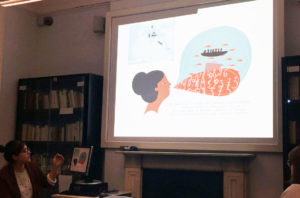 The first session of the workshop addressed the role of illustration in refugee narratives. Our visiting fellow, the children’s illustrator Francesca Sanna, shared details of the research involved in creating her award-winning book, The Journey. Her research included detailed interviews with refugees based in refugee camps. In her talk, she discussed some of the challenges she encountered during this process, some of which were resolved by her commitment to drawing and sketching with refugees themselves. Francesca’s presentation prompted wide-ranging discussion from workshop participants, such as on the problem of aestheticizing or sweetening the experiences of refugees when trying to interpret them for children. Francesca argued that her research on the aesthetics of UNICEF campaigns had convinced her that frequent repetition of the same images of refugees made campaigns less powerful and effective.
The first session of the workshop addressed the role of illustration in refugee narratives. Our visiting fellow, the children’s illustrator Francesca Sanna, shared details of the research involved in creating her award-winning book, The Journey. Her research included detailed interviews with refugees based in refugee camps. In her talk, she discussed some of the challenges she encountered during this process, some of which were resolved by her commitment to drawing and sketching with refugees themselves. Francesca’s presentation prompted wide-ranging discussion from workshop participants, such as on the problem of aestheticizing or sweetening the experiences of refugees when trying to interpret them for children. Francesca argued that her research on the aesthetics of UNICEF campaigns had convinced her that frequent repetition of the same images of refugees made campaigns less powerful and effective.
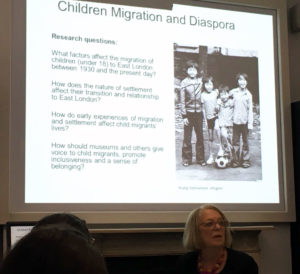 The second session considered how the stories of refugees are communicated in public display. Eithne Nightingale presented her current work on ‘Children, Migration and Diaspora’ in collaboration with the V&A Museum of Childhood and Queen Mary, University of London. Eithne discussed the co-production of migration stories with child refugees through film, social media and public events in museums. She raised problems such as the need to build trust between interviewer and interviewee and the importance of oral history training. These questions foregrounded the screening of the film Passing Tides from the Child Migrant Stories project. Linh Vu, whose personal story was the focus of the film, then reflected on her own migration experiences. Like Francesca, Linh also emphasised the importance of drawing as a means of depicting traumatic experiences. Following both talks, discussions zoomed in on questions of terminology and bureaucratic categories of different kinds of people on the move, particularly in the cases where individuals interviewed for the project did not adopt the term ‘migrant’ for themselves. Many of the authors present echoed their concerns about finding suitable terms for writing and depicting refugee stories for children.
The second session considered how the stories of refugees are communicated in public display. Eithne Nightingale presented her current work on ‘Children, Migration and Diaspora’ in collaboration with the V&A Museum of Childhood and Queen Mary, University of London. Eithne discussed the co-production of migration stories with child refugees through film, social media and public events in museums. She raised problems such as the need to build trust between interviewer and interviewee and the importance of oral history training. These questions foregrounded the screening of the film Passing Tides from the Child Migrant Stories project. Linh Vu, whose personal story was the focus of the film, then reflected on her own migration experiences. Like Francesca, Linh also emphasised the importance of drawing as a means of depicting traumatic experiences. Following both talks, discussions zoomed in on questions of terminology and bureaucratic categories of different kinds of people on the move, particularly in the cases where individuals interviewed for the project did not adopt the term ‘migrant’ for themselves. Many of the authors present echoed their concerns about finding suitable terms for writing and depicting refugee stories for children.
The third session of the workshop centred around Dr Kiera Vaclavik from Queen Mary, University of London and her talk on lessons from literature that presents explicit historical and political narratives to young readers. Kiera examined two in some ways problematic, French books (Rêves amers by Maryse Condé, and Evelyne Brisou-Pellen’s, Deux grains de cacao). She noted that depicting the stories of refugees in children’s books can allow ‘a crime against humanity to become the background to an adventure story.’ Kiera’s talk and the subsequent discussion addressed the political limits of empathy, the importance of achieving a balance between pity and empathy, and the dangers of objectifying the reader.
The remainder of the afternoon was devoted to a discussion of the publication process of children’s literature. Harriet Birkenshaw from NoBrow/Flying Eye Books provided an introduction to the work of her publishers. Harriet noted that one in four books bought today was a children’s book and creative non-fiction is the fastest growing market. She emphasised how important it was, in such a saturated market, that children’s books had a purpose and a powerful narrative that speaks not just to children but also to an adult audience. Her presentation provided examples of works that achieved this and also provided insight into the compromises that had to be made when publishing a children’s book.
The workshop concluded with an opportunity for attendees to introduce their current projects. Attendees welcomed the opportunity to think through new ideas and identify new resources. As one attendee of the workshop noted, ‘it has been so helpful today hearing the nuanced discussions.’ Similarly, another participant commented, ‘I think it’s great, and very unusual actually, to have practitioners and academics, people from ‘the real world’ and different actors all contributing.’
Following the success of the workshop, we will organise a similar event at Birkbeck in June, with a wider range of participants. Further details of this will be available on our blog and the events page of our website soon.

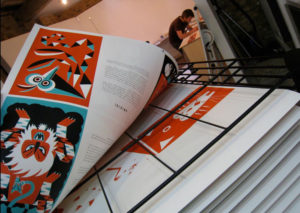


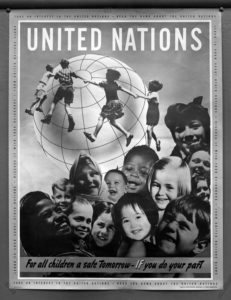

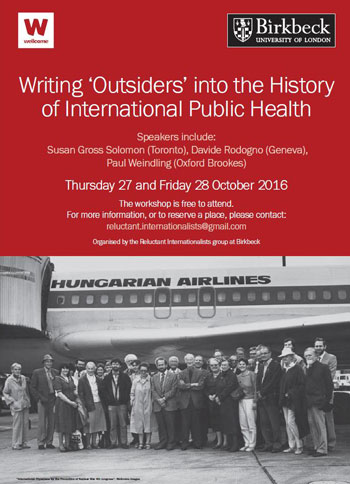 Workshop Report – Writing “Outsiders” into the History of International Public Health, Birkbeck 27-28 October 2016
Workshop Report – Writing “Outsiders” into the History of International Public Health, Birkbeck 27-28 October 2016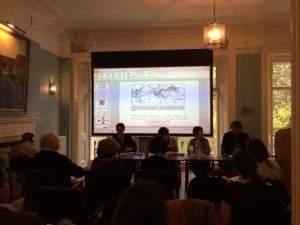
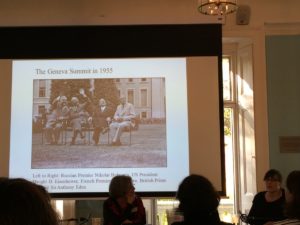
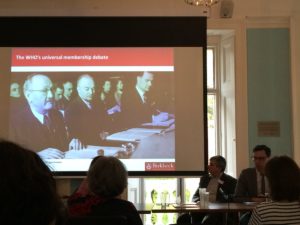
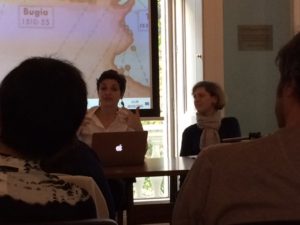
 The 20th century was a period of extremes, of contrasts and contradictions. It witnessed destructive wars, and yet periods of unprecedented peace. Increasing wealth was joined by higher levels of poverty. There was scientific and technological progress, but also inhumanity and repression. The map was one of the century’s principal objects. Thanks to developments in geography education, cheaper and quicker mapmaking processes, and increasing travel and migration, maps became common, trusted and powerful things in western society. Yet maps were not passive or neutral objects. They were agents of change, presenting only versions of reality, not the reality itself. They were capable of informing, but also misleading. They were tools of control and of protest, and even changed the world.
The 20th century was a period of extremes, of contrasts and contradictions. It witnessed destructive wars, and yet periods of unprecedented peace. Increasing wealth was joined by higher levels of poverty. There was scientific and technological progress, but also inhumanity and repression. The map was one of the century’s principal objects. Thanks to developments in geography education, cheaper and quicker mapmaking processes, and increasing travel and migration, maps became common, trusted and powerful things in western society. Yet maps were not passive or neutral objects. They were agents of change, presenting only versions of reality, not the reality itself. They were capable of informing, but also misleading. They were tools of control and of protest, and even changed the world.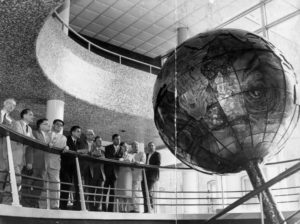 Each walking tour will explore a particular international network or project that took shape in London. Each walk will last around an hour and a half.
Each walking tour will explore a particular international network or project that took shape in London. Each walk will last around an hour and a half.